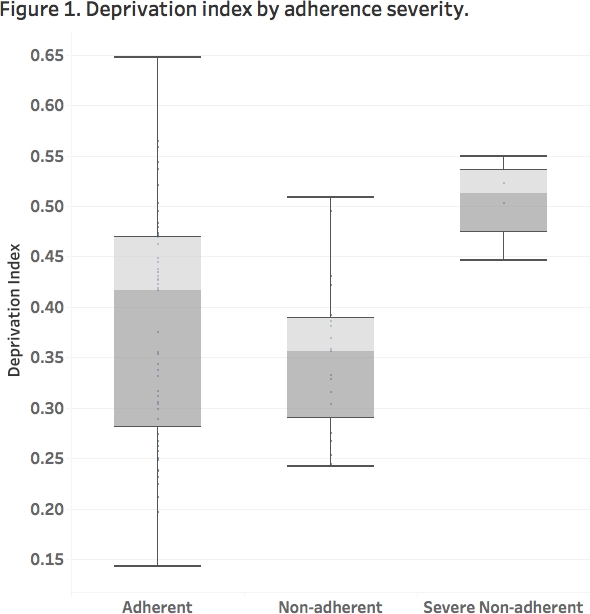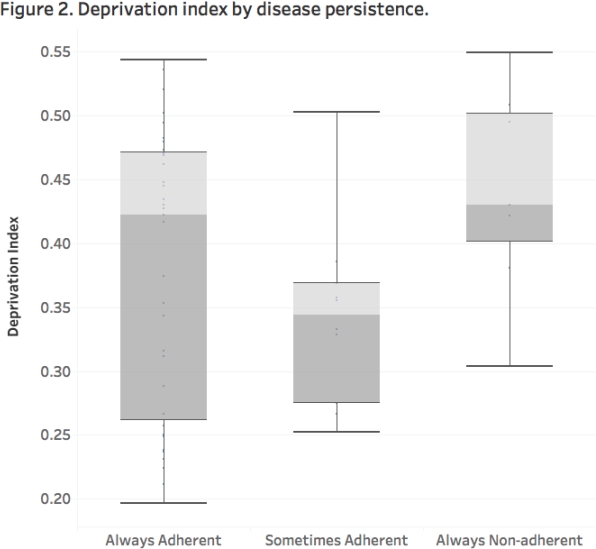Medication Adherence: Does Where You Live Matter?
S. Wadhwani,1 S. Taylor,1 C. Brokamp,1 W. Guo,1 E. Shemesh,2 J. Bucuvalas.1
1Cincinnati Children's Hospital Medical Center, Cincinnati
2Mount Sinai School of Medicine, New York.
Meeting: 2018 American Transplant Congress
Abstract number: 380
Keywords: Liver transplantation, Pediatric, Psychosocial
Session Information
Session Name: Concurrent Session: Psychosocial and Treatment Adherence
Session Type: Concurrent Session
Date: Monday, June 4, 2018
Session Time: 4:30pm-6:00pm
 Presentation Time: 4:54pm-5:06pm
Presentation Time: 4:54pm-5:06pm
Location: Room 3AB
Background & Objectives: Medication non-adherence remains problematic in pediatric liver transplant (LT)[mdash]estimates suggest that up to 53% of adolescents are non-adherent. We leveraged data from subjects who were enrolled in the MALT clinical trial (NCT01154075) to learn if community deprivation predicted non-adherence in pediatric LT recipients.
Methods: This was a single-center pilot study. The primary outcome was Medication Level Variability Index (MLVI); an objective, validated biomarker of non-adherence. Primary exposure, derived from participant addresses, was a validated index of community deprivation using data from the US Census Bureau. The index has a range of [0, 1] with higher values indicating greater deprivation.
Results: Deprivation measures were extracted from 75/80 patients (93.8%). Patients were stratified into three groups of adherence severity: adherent (MLVI <2.0), non-adherent (MLVI 2.0-3.5) and severe non-adherent (MLVI >3.5). Mean deprivation index was 0.38, 0.35 and 0.51, respectively (Figure 1; ANOVA p = 0.03). The odds ratio for being severe non-adherent with every 0.1 increase in the deprivation index was 4.2 [95% CI 1.34-21.99]. Patients were then stratified by adherence persistence. Mean deprivation index by adherence persistence was 0.38, 0.34 and 0.44 for always adherent, sometimes adherent and always non-adherent, respectively (Figure 2; ANOVA p = 0.10).
Conclusion: The results indicate that adherent patients live across the spectrum of deprivation[mdash]suggesting that living in a deprived community does not necessarily equate to non-adherence. However, of the non-adherent patients, the data suggest that patients from more deprived communities have a more persistent and severe form of non-adherence. Further work is needed to better characterize this association.
CITATION INFORMATION: Wadhwani S., Taylor S., Brokamp C., Guo W., Shemesh E., Bucuvalas J. Medication Adherence: Does Where You Live Matter? Am J Transplant. 2017;17 (suppl 3).
To cite this abstract in AMA style:
Wadhwani S, Taylor S, Brokamp C, Guo W, Shemesh E, Bucuvalas J. Medication Adherence: Does Where You Live Matter? [abstract]. https://atcmeetingabstracts.com/abstract/medication-adherence-does-where-you-live-matter/. Accessed February 26, 2026.« Back to 2018 American Transplant Congress


